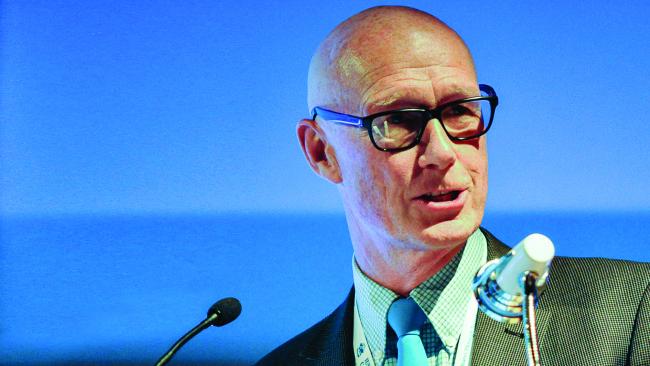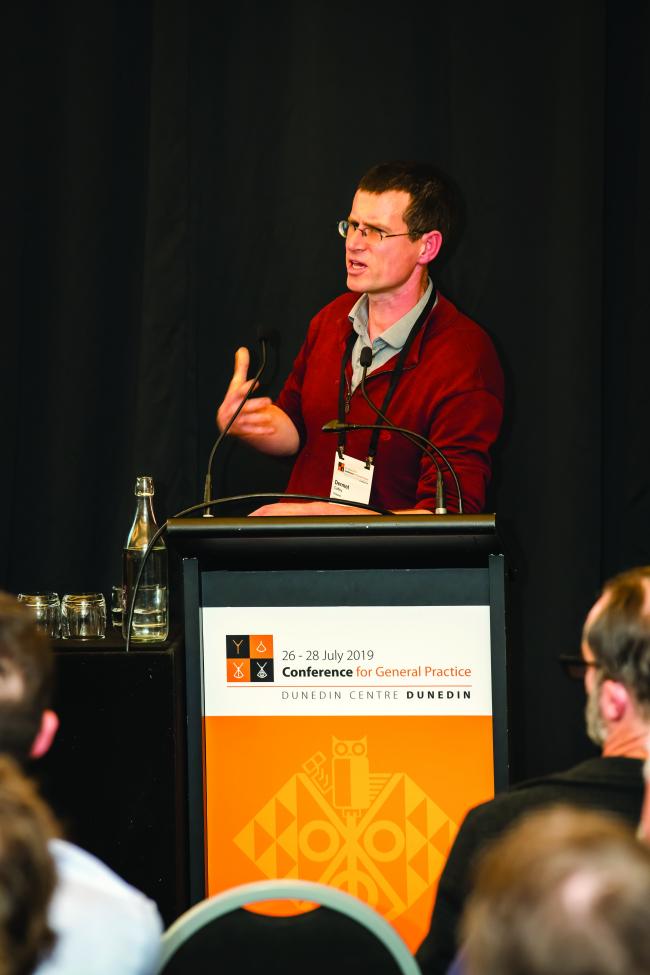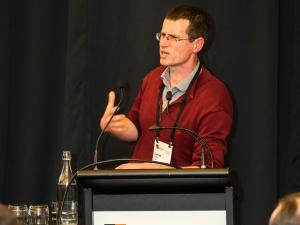Respiratory physician Lutz Beckert considers chronic obstructive pulmonary disease management, including the prevention of COPD, the importance of smoking cessation and pulmonary rehabilitation, and the lifesaving potential of addressing treatable traits. He also discusses the logic of inhaler therapy, moving from single therapy to dual and triple therapy when indicated, as well as other aspects of management
Unashamedly political: How GPs can lobby with the best
Unashamedly political: How GPs can lobby with the best

Here at New Zealand Doctor Rata Aotearoa we are on our summer break! While we're gone, check out Summer Hiatus: Stories we think deserve to be read again!
Archival rummage 3 November 2019. With a general election in 2023, it’s time to hone your lobbying skills. In November 2019, Martin Johnston hunted down advice on advocacy – Barbara Fountain
In the countdown to next year’s election, MPs can expect to hear more from health advocates door-knocking, emailing and generally twisting MPs’ arms to fix problems.
A sugar levy, hiking the alcohol tax and reducing the number of tobacco retailers will be health-promoting policies an army of advocates will be pressing on government and opposition members. And, if they don’t like this increase in lobbying from the likes of doctors, nurses, health researchers and community campaigners, MPs can complain to health minister David Clark.
Dr Clark seeded the idea in August at the GP CME South conference, helpfully advising attendees to sharpen up their advocacy tactics.
“One of the opportunities that seems to me that is missed is to talk to backbench MPs across the parliamentary spectrum,” Dr Clark told the conference, immediately after a presentation on alcohol policy by Sally Casswell, of Massey University.
Professor Casswell discussed the harms of alcohol marketing and followed up with a call for the Government to buy out alcohol industry sponsorship of sport, as it did with sponsorship by the tobacco industry following the Smoke-free Environments Act 1990.
“I was just saying to Sally,” Dr Clark says, “one of the things I say to everybody who has an interest in public health, which I suspect is most of you, please make sure that you do get out and talk to politicians.
“Sally made the point that the alcohol lobby has really effective marketing, a slick way of interacting with politicians, with the public, with everybody.”
ACCORDING TO DR CLARK, backbench MPs have time on their hands and, ever hopeful of ministerial appointment, are keen to learn. Perhaps equally important, he noted a minister’s signature can’t solve everything.
“People hear you are the minister of health and think you can fix it. I would like to be all-powerful but I’m not.
“People underestimate the impact that backbench MPs have. That collective input is what makes the Parliament, is what makes the votes in Parliament, is all of those backbench MPs – and most of them are electorate MPs and have constituency clinics.
“So every one of you people should probably be going and visiting your local MP once a year to update them on the latest research. Every one of you should once a year be writing a letter to a newspaper. Every one of you should be encouraging your friends to do the same.”
Dr Clark seems to dismiss the idea that the liquor industry employs the darkest of dark-arts lobbying, saying “they are cleverer than that”, and adds that lobbyists are well armed with facts.
“It’s much more about making sure that everybody has the facts at their disposal when they are having debates in Parliament and elsewhere.”
Professor Casswell, director of the social and health outcomes research and evaluation centre at Massey University, says she has never lobbied individual MPs, but she expects members of the new Health Coalition Aotearoa will do so.
“It’s only because I don’t have time and it’s not part of my job, but I think it’s really important.
“In a coalition government, no one party can make all the decisions. If they have got some party or some parliamentarians against, it’s difficult for them. So I think it probably is a really worthwhile thing to do, to let your local MP know where you stand on key issues.
“I have just been at a meeting of Health Coalition Aotearoa talking about these sorts of issues we need to get onto the political agenda in order for whatever party is in power next year, for them to look at what the policy needs are.”
A year ago, Dr Clark was at the Health Coalition Aotearoa launch at Parliament. An umbrella organisation for NGOs, the healthcare sector and researchers, the coalition aims to persuade the Government to adopt healthier policies on alcohol, tobacco, and food and drink.
It brings a unified voice to the many organisations that have struggled to make headway on policies such as restricting the marketing of unhealthy foods to children and adolescents, mandatory star ratings on packaged food, a 20 per cent sugar levy and tightening controls on alcohol marketing.
The group notes that unhealthy diets, high BMI, tobacco and alcohol, contribute about a third of the preventable health loss in New Zealand. “As a collective, we strive to prevent harm from unhealthy commodities and to strengthen the foundations of public health,” the coalition’s website states. Members include the NZMA, the Stroke Foundation, the Heart Foundation, the Cancer Society, the Royal Australasian College of Physicians and national Māori public health organisation Hāpai Te Hauora. Key people associated with the coalition include University of Auckland professor of population nutrition Boyd Swinburn, Middlemore Hospital intensive care specialist David Galler and Nelson Marlborough DHB principal dental officer Rob Beaglehole.
“We were an interim organisation,” says Professor Casswell. “We’ve just become an incorporated society. We’re getting out to a range of organisations in New Zealand to ask them to join up.
“I think we will be certainly raising issues about what the evidence says would make a real difference.”
Christchurch GP Dermot Coffey, a board member of Ora Taiao/New Zealand Climate & Health Council, is trying to get the RNZCGP to become more active on climate change.
“I suppose with a subject as big and all-encompassing as climate change, our collective voices as part of the RNZCGP are far more effective and likely to be heard, than individual GPs’ advocacy or submissions,” Dr Coffey says.
He recalls his introduction to civic advocacy was in approaching local councillors, when he lived in Wellington, over cycling infrastructure. He wrote emails and submissions, and spoke at workshops and council meetings.
“The only rules I had were to be always civil, to thank councillors and executive staff afterwards regardless of the outcome, to keep all the submissions evidence-based, and to focus primarily on the health impacts of the decisions in question.”
He says GPs are ideally situated to advocate on issues such as cycleways and climate change. As well as being embedded in a community, GPs have a status that allows them “to stick their heads above the parapet to a degree”.
“The health benefits and potential harms are so great that not actively advocating for [climate action] as much as we can is probably unethical.
“As doctors, we do get a certain acknowledgement that’s probably slightly inflated, which to my mind makes it all the more important to use it.”
Lobbyists often find their cause strikes a chord with one or more MPs, particularly opposition members. The sensitivity to community views may be even greater with electorate MPs, especially in marginal seats.
National MPs Shane Reti (Whangārei) and Hamish Walker (Clutha-Southland) have willingly spearheaded campaigns that originated with their constituents.
Mr Walker began a petition to Parliament to save the Lumsden Maternity Centre as a primary birthing unit and not downgrade it to a maternal and child hub. More than 5000 people signed the appeal.
Carrie Williams, an advocate for the birthing unit, is a trustee of the Northern Southland Medical Trust, which owns the Lumsden building at the centre of the controversy.
She recalls Mr Walker’s involvement began after Southland DHB released a plan foreshadowing the birthing unit’s closure.
“He called us immediately, and said he was interested in this issue and ‘how can I help?,’” Ms Williams says.
“We had requested a meeting with him. But before that, a report was released that alarmed him and he pushed forward the meeting to the next day. We had contacted his office, but hadn’t met him or his representatives.”
Ms Williams’ group also contacted southern-based list MPs Liz Craig (Labour) and Mark Patterson (New Zealand First).
“They haven’t been as involved in the issue. They haven’t been as activist in their approach as Hamish Walker. It’s not that we don’t have a good working relationship with Liz Craig and Mark Patterson; they have different constraints to work within than Hamish.
“It doesn’t matter what party Hamish Walker represents. It was that National was in opposition. It would have been the same four years ago [when Labour was in opposition] if we had been working with a Labour MP.
“We got huge attention from Hamish. He spent so much time on this, it’s phenomenal.”
Mr Walker says the community didn’t need to lobby him over the issue. When the DHB plan was revealed, he immediately saw a risk to the community because there are more than 100 births in the Lumsden health catchment each year and it is more than an hour away from a secondary hospital. He knew what he had to do.
“Politicians don’t like negative media. I had to get the media involved.”
As well as the petition, he organised a protest march in Lumsden. About 450 people – more than the town’s population – took part.
“The petition went to the select committee, and we had the opportunity to recommend to the Government to reinstate services, but the two local list MPs voted that down,” Mr Walker says.
“We had a separate vote on whether to investigate the DHB, and they voted that down too.
“I told the Government there will be babies born on the side of the road, and it would be hard to employ midwives. Both of those have happened.”
Lumsden Medical Centre GP Mathew Stokes, who was part of the community campaign, says Dr Clark wouldn’t talk with the group.
He says the key in getting a backbench MP to help on an issue is to find someone who believes in helping the population.
“Hamish Walker has been fantastic for his community. He met with us early and still continues to have contact with us.”
Despite the local MP’s efforts, Dr Stokes says, there has been “not one positive outcome” from the stressful process, and he remains disheartened.
GP Dr Reti, who notes he is the only practising doctor in the present Parliament, says he handles numerous health matters for constituents, such as people seeking help after being declined ACC cover or after failing to be accepted onto a DHB surgery waiting list.
“What I do is bring my clinical mindset to that. I understand the booking process – CPAC [clinical priority assessment criteria], what might go onto the list or not.”
He says it’s a form of triage. To some, he will explain they are unlikely to get onto the list; or, if he thinks the Northland DHB has made a bad call, he may take the person’s case through the board secretary.
“If it’s not a DHB issue, I have a range of tools,” Dr Reti says. He reckons the most powerful is the written parliamentary question. “Within six days, the minister has to answer, and it’s as if you ask the question in the House.”
Dr Reti says his office is regularly approached by people in primary healthcare, typically on workforce issues (“we are struggling to get locums”). Northland pharmacists and their national representatives have been vocal since the measles outbreak became serious.
He had been working with pharmacists for some time seeking changes to allow them to do on-site vaccinations as per the full National Immunisation Schedule. Then, when the measles outbreak took off in July and August, he began a political campaign for pharmacists to be able to administer the measles, mumps and rubella vaccine.
Asked how much influence an opposition MP can have over government matters, Dr Reti says, “We can still have an impact in opposition. I’m proposing we authorise pharmacists to give the measles vaccine. I have expectations that that will happen.”
His prediction has proved correct. Since he spoke, the Government has changed the pharmaceutical schedule and the classification of MMR vaccines to allow pharmacists trained as vaccinators to administer the injection for people over 16 at DHB-contracted pharmacies.
Already, pharmacists who have completed vaccinator training can administer some vaccines, including state-funded influenza immunisations for pregnant women and the over-65s.
Dr Reti says up to a quarter of Northland pharmacists have completed vaccinator training and, “in times of a serious outbreak such as this, we should be making use of that resource”.
With MPs feeling keenly the democratic incentive to be responsive to voters, Ora Taiao’s Dr Coffey has some advice for GPs thinking of trying their hand at influencing that responsiveness.
“Think of the best way you can make a difference with the time you have available, and put your energy into that. Politicians in New Zealand are approachable and friendly.”








![Barbara Fountain, editor of New Zealand Doctor Rata Aotearoa, and Paul Hutchison, GP and senior medical clinician at Tāmaki Health [Image: Simon Maude]](/sites/default/files/styles/thumbnail_cropped_100/public/2025-03/Barbara%20Fountain%2C%20editor%20of%20New%20Zealand%20Doctor%20Rata%20Aotearoa%2C%20and%20Paul%20Hutchison%2C%20GP%20and%20senior%20medical%20clinician%20at%20T%C4%81maki%20Health%20CR%20Simon%20Maude.jpg?itok=-HbQ1EYA)
![Lori Peters, NP and advanced health improvement practitioner at Mahitahi Hauora, and Jasper Nacilla, NP at The Terrace Medical Centre in Wellington [Image: Simon Maude]](/sites/default/files/styles/thumbnail_cropped_100/public/2025-03/2.%20Lori%20Peters%2C%20NP%20and%20advanced%20HIP%20at%20Mahitahi%20Hauora%2C%20and%20Jasper%20Nacilla%2C%20NP%20at%20The%20Terrace%20Medical%20Centre%20in%20Wellington%20CR%20Simon%20Maude.jpg?itok=sUfbsSF1)
![Ministry of Social Development health and disability coordinator Liz Williams, regional health advisors Mary Mojel and Larah Takarangi, and health and disability coordinators Rebecca Staunton and Myint Than Htut [Image: Simon Maude]](/sites/default/files/styles/thumbnail_cropped_100/public/2025-03/3.%20Ministry%20of%20Social%20Development%27s%20Liz%20Williams%2C%20Mary%20Mojel%2C%20Larah%20Takarangi%2C%20Rebecca%20Staunton%20and%20Myint%20Than%20Htut%20CR%20Simon%20Maude.jpg?itok=9ceOujzC)
![Locum GP Helen Fisher, with Te Kuiti Medical Centre NP Bridget Woodney [Image: Simon Maude]](/sites/default/files/styles/thumbnail_cropped_100/public/2025-03/4.%20Locum%20GP%20Helen%20Fisher%2C%20with%20Te%20Kuiti%20Medical%20Centre%20NP%20Bridget%20Woodney%20CR%20Simon%20Maude.jpg?itok=TJeODetm)
![Ruby Faulkner, GPEP2, with David Small, GPEP3 from The Doctors Greenmeadows in Napier [Image: Simon Maude]](/sites/default/files/styles/thumbnail_cropped_100/public/2025-03/5.%20Ruby%20Faulkner%2C%20GPEP2%2C%20with%20David%20Small%2C%20GPEP3%20from%20The%20Doctors%20Greenmeadows%20in%20Napier%20CR%20Simon%20Maude.jpg?itok=B0u4wsIs)
![Rochelle Langton and Libby Thomas, marketing advisors at the Medical Protection Society [Image: Simon Maude]](/sites/default/files/styles/thumbnail_cropped_100/public/2025-03/6.%20Rochelle%20Langton%20and%20Libby%20Thomas%2C%20marketing%20advisors%20at%20the%20Medical%20Protection%20Society%20CR%20Simon%20Maude.jpg?itok=r52_Cf74)
![Specialist GP Lucy Gibberd, medical advisor at MPS, and Zara Bolam, urgent-care specialist at The Nest Health Centre in Inglewood [Image: Simon Maude]](/sites/default/files/styles/thumbnail_cropped_100/public/2025-03/7.%20Specialist%20GP%20Lucy%20Gibberd%2C%20medical%20advisor%20at%20MPS%2C%20and%20Zara%20Bolam%2C%20urgent-care%20specialist%20at%20The%20Nest%20Health%20Centre%20in%20Inglewood%20CR%20Simon%20Maude.jpg?itok=z8eVoBU3)
![Olivia Blackmore and Trudee Sharp, NPs at Gore Health Centre, and Gaylene Hastie, NP at Queenstown Medical Centre [Image: Simon Maude]](/sites/default/files/styles/thumbnail_cropped_100/public/2025-03/8.%20Olivia%20Blackmore%20and%20Trudee%20Sharp%2C%20NPs%20at%20Gore%20Health%20Centre%2C%20and%20Gaylene%20Hastie%2C%20NP%20at%20Queenstown%20Medical%20Centre%20CR%20Simon%20Maude.jpg?itok=Z6u9d0XH)
![Mary Toloa, specialist GP at Porirua and Union Community Health Service in Wellington, Mara Coler, clinical pharmacist at Tū Ora Compass Health, and Bhavna Mistry, specialist GP at Porirua and Union Community Health Service [Image: Simon Maude]](/sites/default/files/styles/thumbnail_cropped_100/public/2025-03/9.%20Mary%20Toloa%2C%20Porirua%20and%20Union%20Community%20Health%20Service%20in%20Wellington%2C%20Mara%20Coler%2C%20T%C5%AB%20Ora%20Compass%20Health%2C%20and%20Bhavna%20Mistry%2C%20PUCHS%20CR%20Simon%20Maude.jpg?itok=kpChr0cc)